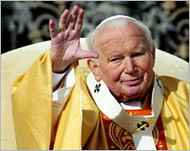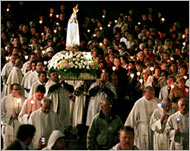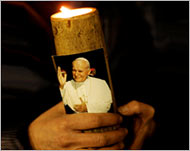Pope left his mark on church, history
John Paul II revolutionised the papacy with his formidable energy and intellectual abilities, but his most lasting memorial was achieved in politics – the collapse of communism in Eastern Europe.

The Pope lent his immense prestige to the outlawed Polish Solidarity movement and triggered a chain reaction that led to the fall of the pro-Soviet governments that had held half the continent in thrall for 40 years.
Although he gave the papacy a higher profile than it had before, he also dismayed many of his admirers with his conservative views on a range of social issues, most notably on birth control.
A warm and earthy figure, the Pope took his message directly to his flock of 1.1 billion in a series of foreign tours, the scale of which was unprecedented in Vatican history.
The first non-Italian pope in four-and-a-half centuries, and the first from Eastern Europe, Karol Wojtyla imposed his own style and agenda, eschewing the pomp that had surrounded his forebears and seeking contact with ordinary people.
His travels took him to at least half the countries of the world, where he argued for peace, denounced human rights abuses and deplored the decadence of the modern world.
He left one of his most momentous acts to the twilight of his papacy – an attempt to purify the soul of the Roman Catholic church with a sweeping apology for sins and errors committed during its 2000 years of existence, implicitly invoking the Crusades, the Inquisition and the Holocaust.
World War II
The future pope was born the son of an army officer in a small town near Krakow in southern Poland.
His mother died when he was eight and thereafter his father looked after him, teaching him German and football.
He entered the Jagellonian University in Krakow, where he became fascinated by theatre, and wrote a number of plays.
 |
|
The Pope’s conservative views |
He was never a member of the Polish resistance, but the experience of war caused him to consider the priesthood. The presence of the Auschwitz death camp barely an hour’s drive from Krakow undoubtedly influenced his views on the sanctity of life.
He became the parish priest in a small village in southern Poland and rose steadily through the Church hierarchy, eventually rising to the rank of cardinal.
When he was elected Pope in October 1978 after seven inconclusive rounds of voting, John Paul II was 58, a robust sportsman and a relative outsider amid the vast bureaucracy of the Holy See.
He had a gift for public relations, addressing journalists in their own languages and remembering their faces. He knew how to use the media in a way unknown to his predecessors.
Fall of communism
The Pope’s first foreign visit, inaugurating his 26-year world tour with its trademark practice of kneeling down to kiss the ground on arrival at every new destination, was to his native Poland.
The advent of a Polish pope provided an immeasurable boost to Polish morale. Despite Soviet warnings, the communist authorities were unable to head off the Pope’s 1979 visit, when he appeared before million-strong crowds speaking powerfully for human rights.
|
|
The upshot was a huge, reinvigorated anti-communist working class movement, the birth of Solidarity and the steady thaw of the communist glacier that lay over Central and Eastern Europe.
 |
|
John Paul II took the papacy to |
For all the Pope’s popularity, his moral teachings – notably on family values, extramarital sex, homosexuality, birth control, euthanasia and abortion -alienated many.
Reformers, the young and congregations in the developing world in the grip of a devastating AIDS epidemic were increasingly dismayed at his refusal to give ground on the issues of contraception and the use of condoms.
John Paul’s policy, however, was not to move the Church beyond the liberalising Vatican II of the 1960s.
The Pope was by no means an unconditional supporter of the values of capitalism and democracy, although he could be prevailed on not to inveigh lengthily in public against the evils of the West.
Assassination attempt
Among these he counted unemployment, poverty and the wealth gap between North and South.
In 1981 he nearly died in an assassination attempt when a rightwing Turkish extremist, Mehmet Ali Agca, shot him at close range in Saint Peter’s Square. One bullet went through his abdomen and another narrowly missed his heart.
He survived after extensive intestinal surgery, although his health was affected thereafter.
 |
|
The Pope had been seriously ill |
John Paul II met almost every significant head of state or government. He became the first pope to pray in a synagogue; the first to enter a mosque in an Islamic country; and the first to preside at a meeting of the heads of the major world religions.
Although his final years were a long story of declining health, he continued to travel around the world as widely as possible.
He issued 14 encyclicals, including three on socio-economic questions, and wrote several books that became bestsellers.
His traditionalist views appeared to harden as he grew older, and his Veritas Splendor encyclical in 1993 and the Evangelium Vitae encyclical of 1995 were uncompromising in their condemnation of contraception and euthanasia.
Declining health
He suffered through health problems in the 1990s, including an operation for a benign intestinal tumor, a fractured shoulder, a broken thigh bone and Parkinson’s disease, which left him increasingly debilitated.
Sex was never far from the surface in the Pope’s declining years with the Church dogged by a series of scandals.
At the behest of US bishops, the Vatican formally approved tough new measures to punish priests who commit sexual abuse, including the outright dismissal from the priesthood of clergy found guilty of abuse.
However, in his latter years, the Pope was increasingly frail and it was apparent he was in decline when, on a visit to Slovakia in September 2003, he was unable to complete an address and on his return was forced to cancel an audience.